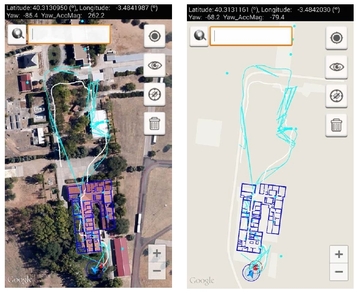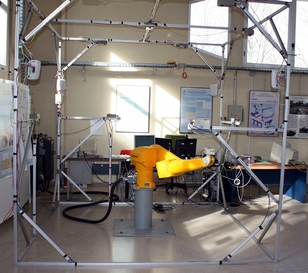LOPSI is a research group specialized in the creation of technological solutions for intelligent environments, which can perceive the presence of people and offer them useful location-based services. We perform both basic research and technological development in this area.
We have two main lines of research:
We have two main lines of research:

1) Localization of people in indoor and GPS-denied areas
The main focus of the LOPSI group is the design and development of Local Positioning Systems (LPS) capable of locating, tracking, and guiding people in indoor and outdoor environments, where GPS receivers are not operative or reliable. Our current methodological approach to indoor localization is the Bayesian combination of ranging information obtained from radiofrequency emitters (such as wifi access points, Bluetooth nodes or dedicated RF beacons) and dead reckoning from user-wearable inertial sensors (foot-mounted or present in a smartphone). Other information, such as provided by signals of opportunity, maps of the environment, etc, can be integrated flexibly and as available. Our technology is aimed for deployment in portable devices like smartphones.
Physical location of users can be complemented by information about their status, such as provided by wearable physiological sensors. We are currently working with wearable motion units with integrated electromyographic and optical pulse sensors to perform activity recognition. The ultimate goal is to improve the performance of Assistance Systems and Health Monitoring applications.
The main focus of the LOPSI group is the design and development of Local Positioning Systems (LPS) capable of locating, tracking, and guiding people in indoor and outdoor environments, where GPS receivers are not operative or reliable. Our current methodological approach to indoor localization is the Bayesian combination of ranging information obtained from radiofrequency emitters (such as wifi access points, Bluetooth nodes or dedicated RF beacons) and dead reckoning from user-wearable inertial sensors (foot-mounted or present in a smartphone). Other information, such as provided by signals of opportunity, maps of the environment, etc, can be integrated flexibly and as available. Our technology is aimed for deployment in portable devices like smartphones.
Physical location of users can be complemented by information about their status, such as provided by wearable physiological sensors. We are currently working with wearable motion units with integrated electromyographic and optical pulse sensors to perform activity recognition. The ultimate goal is to improve the performance of Assistance Systems and Health Monitoring applications.

2) High accuracy 3D positioning with ultrasonic technology
Fine-grained (better than 1 cm accuracy) positioning in small-scale environments is possible by using acoustic / ultrasonic sensors for high precision ranging and multilateration. We use a CDMA setup in order to achieve accurate range estimation and multiple transducer capability, essentially translating the GPS design to an acoustic system. This localization technology is intended for metrological and robotic applications where high precision is indispensable, although it can also be used in general purpose localization scenarios.
Fine-grained (better than 1 cm accuracy) positioning in small-scale environments is possible by using acoustic / ultrasonic sensors for high precision ranging and multilateration. We use a CDMA setup in order to achieve accurate range estimation and multiple transducer capability, essentially translating the GPS design to an acoustic system. This localization technology is intended for metrological and robotic applications where high precision is indispensable, although it can also be used in general purpose localization scenarios.
Fields of application of the technological solutions of the Lopsi group include the development of Assistance Systems for people, Ambient Intelligence applications, Location-Based Services, as well as general industrial applications.
|
Winners of the second EvAAL competition on "Indoor Localization and Tracking for Ambient Assisted Living":
At the Ambient Assisted Living (AAL) forum, held on 24th September, 2012, in Eindhoven, Netherlands, the LOPSI group received an award as winners of the second EvAAL competition (track 1: Indoor Localization and Tracking for AAL), which took place at the Living Lab of the Polytechnic University of Madrid, Spain, in July 2-6, 2012. This competition is a benchmark test of the accuracy, availability, acceptance, and ease of deployment of a Localization System usable for Ambient Assisted Living applications. LOPSI won with a personal localization system based on a combination of RF-based positioning and Pedestrian Dead Reckoning. See the general description of the system and our experience and results at the EvAAL contest here. |
|
Last update: January 19th, 2015

